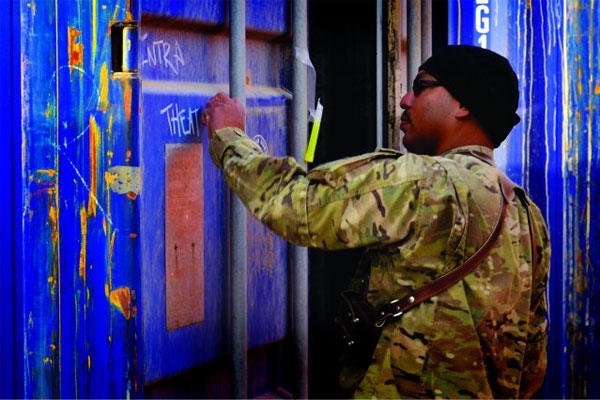The fact that the U.S. Coast Guard has a significant presence in Afghanistan is not well known, and yet it is quite true. Some of its members serve on what is certainly one of the Coast Guard's most inland assignments ever: the redeployment assistance and inspection detachment (RAID) that is spread throughout the landlocked nation.
RAID's activities have gained visibility, and its members have become an increasingly recognizable part of the war effort. The detachment has deployed to several countries in the U.S. Central Command area of operations, and the Coast Guard has maintained a continuous presence in theater since the first RAID forces arrived in September 2003.
ORGANIZATION
RAID falls administratively under the Coast Guard Patrol Forces Southwest Asia, headquartered in Bahrain. Its command element resides at Camp Arifjan, Kuwait, co-located with the headquarters of the Army's 595th Transportation Brigade, Military Surface Deployment and Distribution Command (SDDC). RAID supports SDDC and is operationally controlled under its purview.
In Afghanistan, the detachment's 12 members fall under the tactical command of detachments of the 831st Transportation Battalion. These Coast Guardsmen have been stationed at Bagram Airfield, Kandahar Airfield, and Camp Leatherneck but have journeyed to forward bases all over the country.
Until December 2011, RAID was deployed in support of Operations Iraqi Freedom and New Dawn, inspecting nearly 20 percent of all of the Army's containers, which held 2.2 million pieces of equipment being moved out of Iraq. The end of split combat support operations since early 2012 has greatly eased the accountability mission for this small but widely dispersed unit.
CONTAINER INSPECTIONS
Forces in Afghanistan use standard containers to move equipment and supplies. Freight containers hold several kinds of products, from food to ammunition, and the Army efficiently supplies its forces by using such containerized cargo. The Coast Guard has long specialized in effective container inspections, which is the reason the Coast Guard received this mission.
RAID has worked closely with Australian, British, and Afghan troops while also servicing its primary customer, the U.S. Army. In late 2011, RAID's portfolio expanded to include supporting Marine Corps elements at Camp Leatherneck, where a third of the containers had failed inspections prior to the Coast Guardsmen's arrival.
RAID inspects containers regardless of whether they are transported through Pakistan or through longer routes in central Asia. On average, RAID inspects nearly 300 containers per month. Because fees for cargo held up in Arabian or Central and South Asian ports can cost $5,000 per day, RAID saves the Department of Defense (DOD) a considerable sum in transportation expenses and fees.
Through recertification and corrective fixes, RAID has also reduced the number of containers leased by the DOD. The reduction in leased containers resulted in fee savings of $500,000 in the last quarter of calendar year 2011, solely for the Iraq drawdown.
The cost savings in Iraq are being replicated in Afghanistan. With a similar cycle of redeployment underway, the small RAID element stationed in Afghanistan has remained busy. RAID members inspected more than 7,000 containers on the ground in Afghanistan during 2012.
THE INSPECTION PROCESS
The RAID teams conduct several basic types of inspections. Most of their work revolves around checking for structural seaworthiness. According to international rules, containers must have attached safety plates indicating that they are fit for an ocean voyage. Those that are not structurally safe to take aboard commercial ships are considered "frustrated." Not only can this cargo be blocked from moving through port, but the organizations owning these containers will incur extended leasing fees.
Other inspections include those for proper loading and labeling of hazardous materials, examination and sealing of containers for customs border clearing, reviewing shipping credentials, and on occasion, special procedures for rolling stock. RAID personnel are fully qualified to administer all of these inspections.
Coast Guardsmen go beyond the minimum standards for inspections. They ensure proper packing and documentation, and they also make minor repairs so that containers meet movement standards. RAID members also train Army unit movement officers and hazardous materials certifiers.
RAID's work has been funded out of the approximately $250 million transferred by the DOD to the Coast Guard from the special Overseas Contingency Operations budget. The RAID team has become a sought after element by ground units primarily because it facilitates a safer and more expeditious return home for troops and their equipment.
BEING A RAID MEMBER
Coast Guardsmen from RAID have been to all corners of the current theater of operations. It often proves easier for RAID members to travel to sites than to have the containers brought to a centralized location for inspection. Because their services are needed at so many bases, RAID members are in constant motion.
RAID personnel frequently journey to outlying forward and contingency operating bases around Afghanistan. Air travel is preferable for reasons of personal security, but occasionally RAID members join land convoys moving between posts. As a result, RAID members collectively log an average of 35,000 miles in travel per year. This trekking has not been without dangers; they have been exposed to direct and indirect fire in various locations.
Withstanding the comparatively spartan and arduous conditions of Army and Marine Corps field life is by all measures a novel experience for RAID members. They live in freight containers, tents, or B-huts and periodically have to run for the bunkers during mortar attacks.
With these conditions in mind, program staff carefully select RAID personnel for this demanding work. They have historically been drawn from the ranks of senior and experienced Coast Guard Reservists and are often law enforcement or emergency response veterans in the civilian sector. More recently, high-performing active-duty Coast Guardsmen have been added to the ranks, giving the team a more effective mix.
All RAID team members are volunteers. Enhanced pay, priority selection for future assignments, and a rest and relaxation trip to anywhere in the world are among the incentives offered, and to varying degrees these factors do matter to those who join the team. But these Coast Guardsmen are also motivated by the desire to do their part by directly supporting troops in the combat zone. It is in this manner that their specialized Coast Guard marine safety expertise has played an important part in the war effort.
To prepare for deployment, the RAID teams undergo extensive training. Members first attend preparatory weapons and force protection training at a contracted facility in Moyock, N.C. Then they report to Fort Dix, N.J., for a month of intensive combat training and theater orientation conducted by experienced Soldiers. There they are also exposed to the Army's very different way of doing things. In the meantime, all personnel acquire Coast Guard inspector qualifications if they do not yet already possess them.
The shipmates arrive in theater first in Kuwait, where personnel conduct inspections at Camps Arifjan, Buehring, and Patriot under the aegis of the 595th Transportation Brigade. After this initial assignment, they rotate forward into what is still a hazardous combat zone.
In Afghanistan, RAID Coast Guardsmen are part of a small element doing a big job, and they do it well. Over the last decade, multiple RAID members have been selected as the Coast Guard's enlisted person of the year following the conclusion of their tours. RAID members also have received Army, Navy, and Marine Corps medals, including the Bronze Star. Furthermore, during their off-duty hours, RAID personnel have volunteered to assist in tending to wounded personnel in base hospital emergency rooms, spent time teaching English to local children, and staffed the United Service Organization's entertainment centers.
Through their status as RAID members, Coast Guardsmen operate in forward areas, notably far removed from any major body of water. These U.S. military personnel continue to successfully represent their branch by serving as its "tip of the spear" in a current combat theater of operations.




























